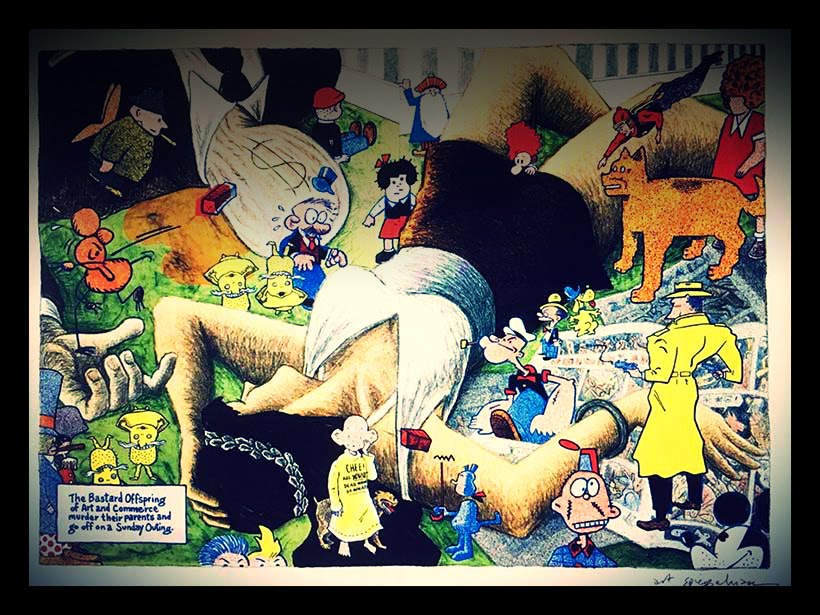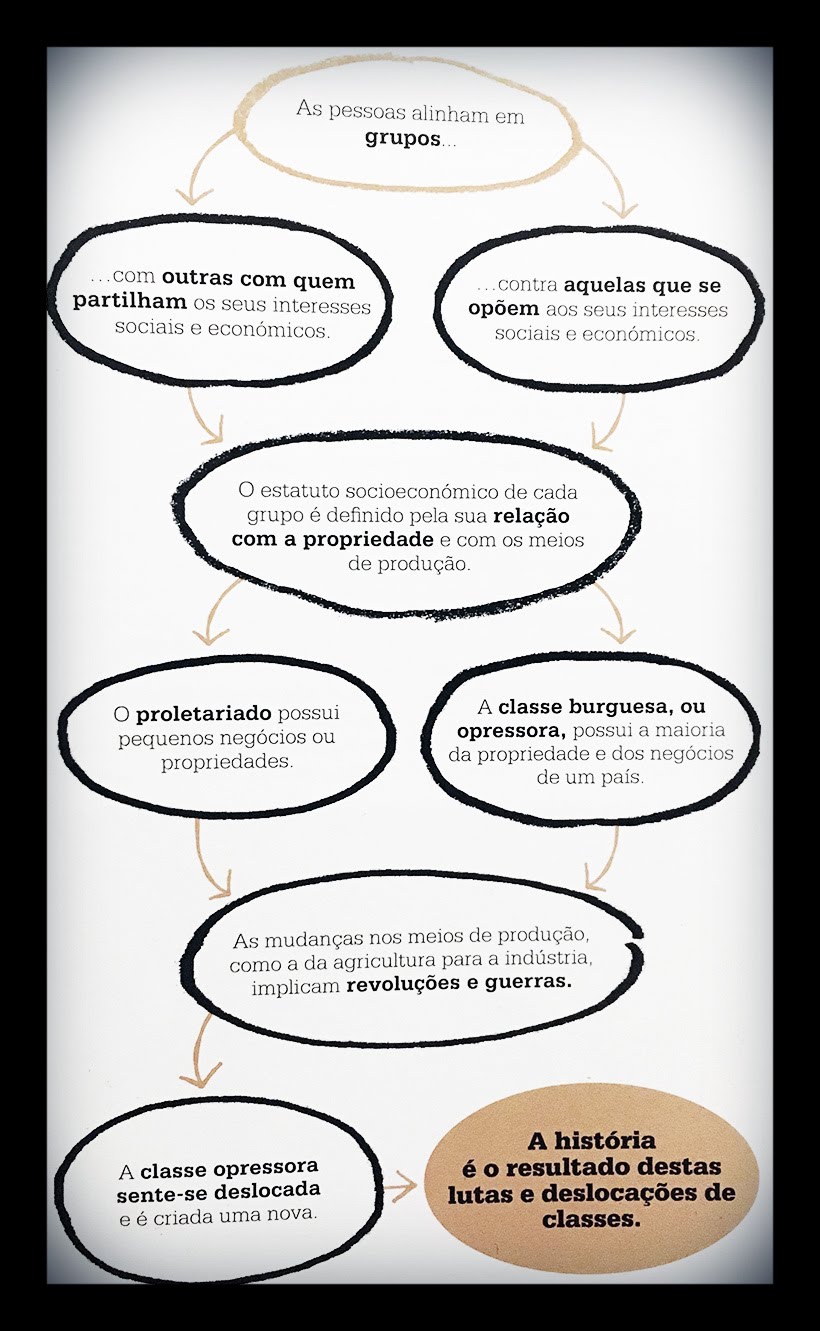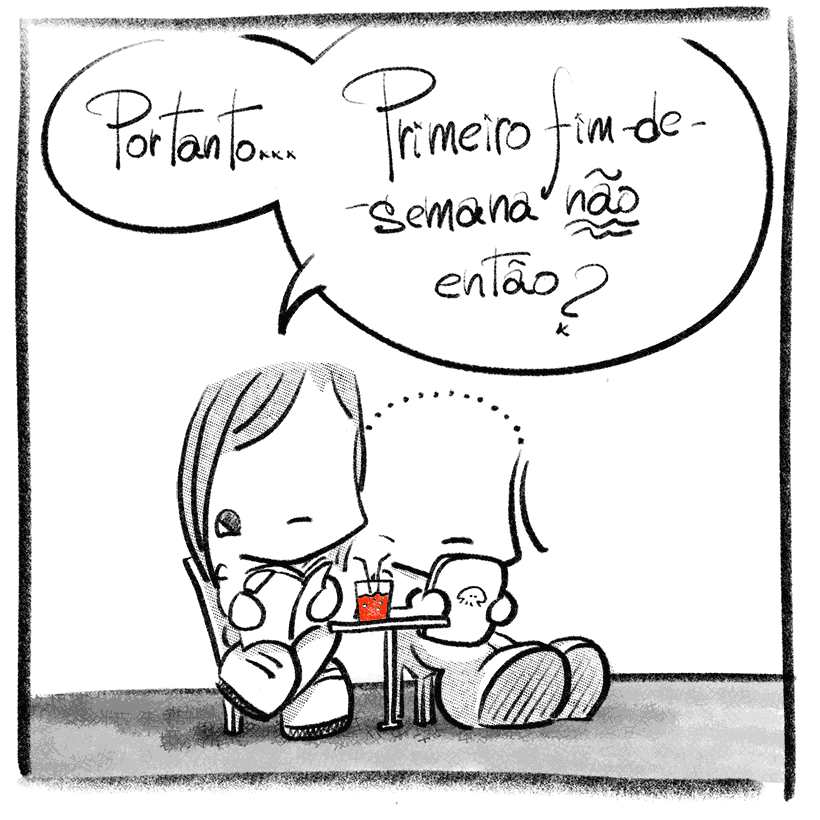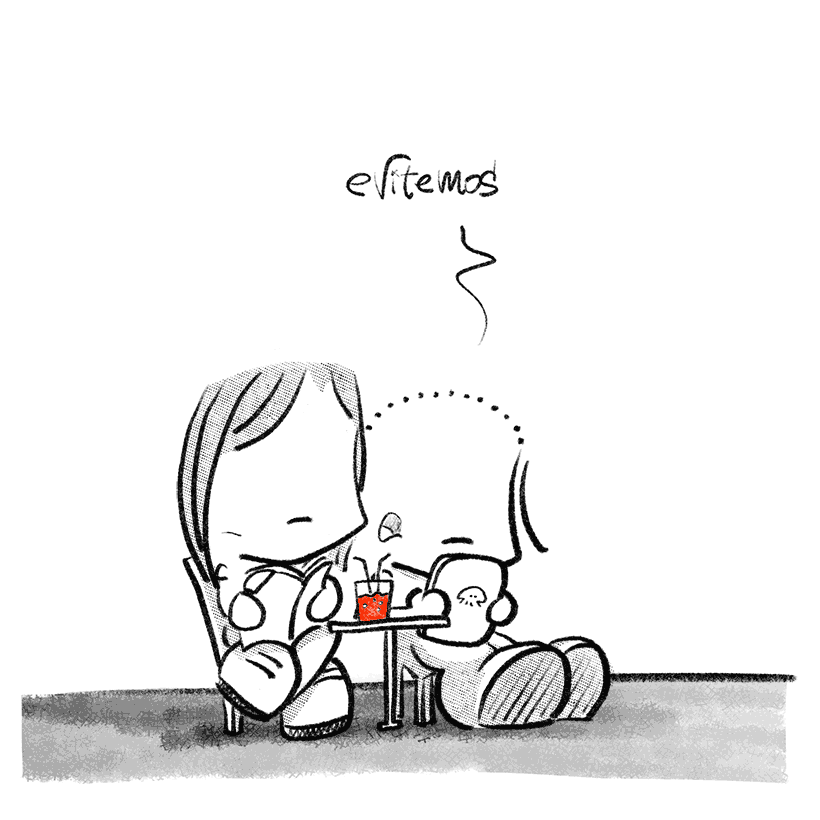materialismos históricos em banda desenhada
e o Festival Internacional de BD de Beja
Da história material ao que deveria ser capital comum da Humanidade, a nossa intervenção anterior passará despercebida em intenções aos alheados de pormenores. Teimemos: apresentámos a adaptação de Martin Rowson do "The Communist Manifesto" à laia de putativo benchmarking, não falte imaginação aos que descuram do entrelinhas. Daqui, um pequeno salto ao melhor da banda desenhada que se congrega nestes dias: obviamente, chegados ao Festival de BD de Beja.
I
O programa anuncia exposições e outros conformes à circunstância, mas a nossa atenção recairá invariavelmente em leituras que poucos enfada: não tratamos o que dizem, mas do que dizem. Insistimos. São frentes que não inquietarão festivais ainda aos papéis, mas toca a todos os que notam a paridade actual de meios de produção/consumo na BD desmaterializada pelo digital com outras revoluções.
 "The Bastard Offspring of Art and Commerce Murder Their Parents and Go off on a Sunday Outing" de Art Spiegelman
"The Bastard Offspring of Art and Commerce Murder Their Parents and Go off on a Sunday Outing" de Art SpiegelmanRelembramos. A BD como a reconhecemos surge na imprensa no virar do século XIX entre lutas de jornais embirrados de notícias falsas e sensacionalismo para as massas analfabetas, devendo a sua génese às tecnologias de impressão em falta e ocupando a mais baixa consideração em escalas de legitimidade artística como "bastarda da arte e do comércio".
Um rearranjo de X e I e no virar do século XXI todas as forças que moldaram a BD acordam em tumulto selvagem, apenas o ambiente de sensacionalismo e fake news às massas iletradas a equivalência possível, não errassem pela novidade da regressão que são. A indústria que a sustenta arrastada no turbilhão do digital, a imprensa particularmente intimada improvisa sem rumo a um passo do cataclismo total. A impressão, processo que se confunde à própria acepção da banda desenhada enquanto meio, hoje mera opção facultativa removida a imperativa necessidade. Dessa liberdade, uma esquizofrenia do progresso resistido à graça do fetiche do leitor, preguiça do autor ou insipiência de ambos. Insulto final a uma arte rasteira e popular, igual atrofio de uma emancipação em compasso de espera espreita sobre a BD: academia, museus e galerias atropelam-se para a erguer a altares que lhe retorcem a natureza. Atracada no passado ou idealizada nesse, a BD deve reinventar-se para permanecer autêntica.
Tech, $$$, os media. A tempestade perfeita de que não te aperceberás ao passear pelas diferentes propostas do Festival — tão informado dessas urgências como um feed do Facebook à realidade. Entre convivas BD digital será sinónimo de Comixology ou timelines de redes sociais, nenhum a merecer dúvidas de maior. O tema sem debate, a workshops do faz-a-tua-BD podem ser acrescidos o habitual faz-o-teu-zine, mas ninguém se deterá pelo mais óbvio faz-o-teu-site para a-tua-BD. Para os mais avançados, faz-a-tua-bd-no-teu-site.
A estreita ligação da BD à indústria/comércio de conteúdos/comunicação, tecnologias de produção/consumo de cultura/informação para as massas/nichos coloca-a em posição privilegiada de arenas onde se ameaça ruir Estados e redesenhar a sociedade a serviço de um par de gigantes corporativos, incidentalmente encontrando-se na linha da frente de revoluções estruturais profundas, canário de mina como a tecelagem e outras manufacturas o estiveram para épocas idas.
Hélas a BD nunca foi um bem de primeira necessidade, e se nos lês pelos cómicos deixamos-te em mãos a problematização dos quadradinhos em apogeu de retangulozinhos, um meio para um fim. A restante missiva destina-se aos punks entre nós e todos os que se ocupam desses fins. Mah luddites, where u at?
II
Seguindo de manifestos comunistas, excertamos livremente outro ensaio de causas comuns para recordar-vos a importância de colocar (certo tipo de) BD online, e não só. Mashup em acelerado porque sabemos que têm sítios para ir hoje.
To the extent that people accommodate themselves to the faceless inflexibility of platforms, they will become less and less capable of seeing the virtues of institutions, on any scale. One consequence of that accommodation will be an increasing impatience with representative democracy, and an accompanying desire to replace political institutions with platform-based decision making. These trends will bring, in turn, the exploitation of communities and natural resources by people who will never see or know anything about what they are exploiting. The scope of local action will therefore be diminished, and will come under increasing threat of spooky action at a distance. This is how nation-states become wholly owned subsidiaries of transnational corporations.
Alan Jacobs in "Tending the Digital Commons: A Small Ethics toward the Future" 2018
A solução? Começa por fazer o teu próprio sítio online, é agora tão rápido como começar um zine.
To teach children how to own their own domains and make their own websites might seem a small thing. In many cases it will be a small thing. Yet it serves as a reminder that the online world does not merely exist, but is built, and built to meet the desires of certain very powerful people - but could be built differently. Given the importance of online experience to most of us, and the great likelihood that its importance will only increase over time, training young people to do some building themselves can be a powerful counterspell.
Training young people how to live and work extramurally is a vital hedge against this future. To know that there are alternatives, and alternatives over which we have a good deal of control, is powerful in itself. And this knowledge has the further effect of reminding us that code — including the algorithmic code that so often determines what we see online — is written by human beings for purposes that may be at odds with our own.
Alan Jacobs in "Tending the Digital Commons: A Small Ethics toward the Future" 2018
Com a Open Web cada vez mais cercada, poucos são aqueles que ainda se recordam desta além-Facebook.
Facebook, Instagram, Snapchat, and Pinterest are walled industrial sites, within which users, for no financial compensation, produce data which the owners of the factories sift and then sell.
Many users feel themselves amply compensated by the aforementioned provisions: ease of use, connection with others, and so on. Why should someone go to the trouble of downloading and learning to use those tools, rather than rely on the freely — or "freely" - available structures of walled factories? Such users should realize that:
- Everything they find desirable and beneficial about those sites could disappear tomorrow and leave them with absolutely no recourse, no one to whom to protest, no claim that they could make to anyone;
- These technologies shape the formation of their understanding of the world—how knowledge is formed and shared; how identity is formed and expressed;
Comparing a platform like Facebook with traditional social institutions we have seen and will continue to see in our social order is the fragmentation of institutions and their effective replacement by platforms. This process has often been celebrated: "the great virtue of the Internet is that it erodes power. It sucks power out of the center, and takes it to the periphery, it erodes the power of institutions over people while giving to individuals the power to run their lives [Esther Dyson]" But, the problem, though, is that disintermediation has not lived up to its potential. Instead, it has facilitated the rise of a new generation of mediators. As much as networked technology has dismantled and distributed power in more egalitarian ways, it has also extended and obscured power, making it less visible and, arguably, harder to resist.
More and more, we will be asking technological platforms to do the kind of unifying work educational institutions clearly can no longer do. Platforms of the Facebook walled-factory type are unsuited to the work of building community, whether globally or locally, because such platforms are unresponsive to their users, and unresponsive by design. Those platforms train us to do what they want us to do, rather than be accountable to our desires and needs. May seem liberating at first but that sense of liberation will continue only insofar as users train themselves to ask the questions the platforms already know how to answer, and think the thoughts the platforms are prepared to transmit.
Alan Jacobs in "Tending the Digital Commons: A Small Ethics toward the Future" 2018
Que nos trás de volta ao repto habitual que vos fazemos. Punx of tha world, UPLOAD!
No one owns the Internet or the World Wide Web. We need to revivify the open Web and teach others — especially those who have never known the open Web — to learn to live extramurally: outside the walls.
The open Web is effectively a set of protocols that allows the creating, sharing, and experiencing of text, sounds, and images on any computer that is connected to the Internet. Those protocols are relentlessly generative, producing a heterogeneous mass of material for which the most common descriptor is simply "content." [We need to] engage with that original purpose of the Web — sharing information and collaborating on knowledge-building endeavors. Far beyond the mere acquisition of skills [the goal is] far more radical: to have a space of their own online, along with the support and the tools to think about what that can look like.
Alan Jacobs in "Tending the Digital Commons: A Small Ethics toward the Future" 2018
Radicalismos que não vos esperam em Beja porque, como antes de Marx, essa história está por escrever. Fica o resumo possível aos miúdos:

As mudanças nos meios de produção implicam revoluções e guerras, história é o resultado dessas lutas e deslocações de classes.


